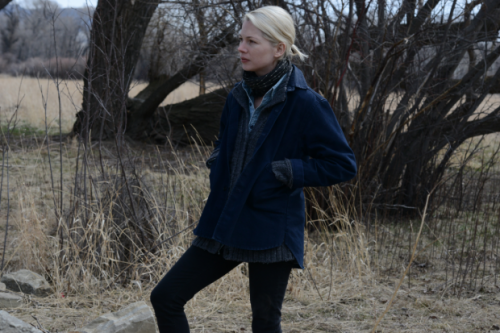Sundance 2016: Certain Women, by David Bax
Kelly Reichardt’s Certain Women consists of three stories about three women. The most obvious connective tissue (other than some characters making brief appearances in others’ stories) is that everything takes place in Montana. Beyond that, though, you’ll find that each segment of the whole takes place in the friction between what these characters expect of the world and what the world expects of them, both as individuals and as women.
In the first story, Laura Dern stars as Laura Wells, a Livingston lawyer with a client named Fuller (Jared Harris) attempting to sue his former employer for worker’s compensation. He doesn’t have a case, though not because he wasn’t wronged but because he wasn’t able to outfox the loopholes his bosses exploited. The only overt comparison in the film between men and women in general comes when Laura points out that Fuller refused for months to believe he was pursuing a lost cause until a male lawyer repeated it to him. Finally aware of his lack of options and therefore out of hope, Fuller takes a security guard hostage and the police send Laura in to talk him down. In that it includes a gun and a bunch of cops, one could argue that this is the most action-packed of the three tales. But Reichardt (who also serves as editor) and cinematographer Christopher Blauvelt let everything unfold with a steady and unembellished pragmatism. The resulting quietude and honesty doesn’t detract from the emotionality of the film; on the contrary, it lends a realism that hits home all the harder.
Having established a measured style, Reichardt moves into the second and probably most low-key chapter. This story concerns nothing more than a couple (Michelle Williams and James Le Gros) and their daughter (Sara Rodier) camping on the site of the country home they intend to build and then visiting an elderly neighbor (Rene Auberjonois) to see if he’ll sell them the pile of sandstone on his property for the construction. It’s a portrait of a functionally unhappy family who have settled into a passive aggressive routine in which Williams’ matriarch always becomes the scapegoat. Even though Le Gros’ Ryan asks his daughter to go easy on her mom and appreciate all she does for them, he turns around in the next scene and tells the neighbor they’re asking for his sandstone because “Gina wants the house to be authentic.” Thoughtless as that may be of Ryan to say, Reichardt (adapting short stories by Maile Meloy) subtly shows us that it’s true and walks us right up to the brink of judging Gina for taking advantage of an old man. But Certain Woman is not a disingenuous film and stops short of telling us how to feel.
The third episode is a slight departure, both because it actually involves two women and also for a reason I’ll get into a bit later. Lily Gladstone (who was in the underseen Winter in the Blood and is absolutely brilliant here) plays Jamie, the lone winter caretaker of a small ranch who, looking for anything to do with her free time, wanders into an evening class taught by a lawyer (Kristen Stewart) from another town. The two develop a routine of hitting the local diner after every Tuesday and Thursday class. The relationship that grows is an unbalanced but touching one and, without disturbing the stillness of the film’s aesthetic and tone, manages to become the mostly grandly moving of the bunch.
Even with the heights that final story hits, Reichardt finds time to include essential shots of Jamie’s daily ranch life. Brushing horses and laying out hay might not be exciting on the page (for that matter, neither is Gina loading sandstone into a truck or Laura watching television with her dog) but these moments and the seriousness with which Reichardt treats them become entrancing, an indelible piece of the fabric.
That other reason I mentioned for the third story’s departure lies in the actions Jamie takes at the end, which I won’t spoil here. But Laura and Gina find themselves, in some way, turned into supporting players in the stories of others (Fuller, Gina’s family). Jamie starts out at risk of being the same to Stewart’s Elizabeth but refuses. Finally, though, each of the protagonists gets an epilogue that may not give them victories but that do give them justice. That’s nothing more than these Certain Women deserve.




























